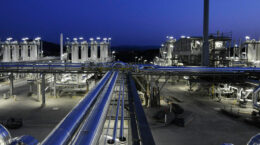
The Lifecycle of Battery Materials
Electromobility is rapidly expanding on a global scale, signaling a more sustainable future for the automotive industry.
Lithium-ion batteries are the key enabler for this disruptive change. As a global leading supplier of materials for lithium-ion batteries, BASF Catalysts aims to contribute to the sustainable battery materials value chain and make electromobility a practical reality for everyone.
As a leading chemical supplier for the automotive industry, BASF is well-positioned to become a sustainable cathode active materials (CAM) producer globally by taking responsibility throughout the battery value chain. We strive to reduce the CO2 burden of electric vehicles and become a reliable partner in support of our customers’ growth.

We invite you to explore the lifecycle of cathode active materials for
lithium-ion batteries by clicking through the wheel.
Mining & Refining the Metal Ore
Lithium-ion batteries begin their life underground, where metal ores such as lithium, nickel and cobalt are extracted from the earth.
The raw materials are leached into a solution, which is then purified through precipitation, solvent extraction or ion exchange. The purified solution is evaporated and crystallized into metal sulfate crystals.
With the aim of increasing sources of locally available content, BASF secures high-purity metal through established partnerships.
PCAM Production
Made through precipitation, precursor cathode active materials (PCAM) is a mixed-metal hydroxide of nickel, cobalt and other chemical elements.
BASF ensures a sustainable and reliable supply chain for metals used in precursors, starting with the mining of metal ores.
BASF’s new precursor plant in Europe will use 100% electrical energy resources, including hydro, wind and biomass-based power. Located near a metal refinery, the plant will receive a secure and consistent supply of nickel and cobalt with a reduced carbon footprint.
CAM Production
CAM plays a pivotal role in lithium-ion batteries and drive battery performance, safety and cost.
BASF’s portfolio of application-specific cathode active materials supports lithium-ion battery technology for electric vehicles with high-energy density, reliability and efficiency.
Focusing on customer proximity, enhancing its product portfolio competitiveness, and securing sustainable raw materials supply, BASF has continued to develop its global footprint and will be the first global supplier with manufacturing capacities in all key regions by 2022.
Cell Manufacturing
Cathode active materials are delivered to a cell producer and processed in a battery cell manufacturing line. Completed cells are later combined into modules and shipped to electric vehicle manufacturers (OEMs).
BASF’s innovative materials and technologies will enhance battery performance for electric vehicles.
Manufacturing fully electric and plug-in hybrid vehicles
With their production now complete, batteries are installed in electric cars and plug-in hybrid vehicles.
In combination with renewable energy used for battery charging, electromobility can significantly improve air quality, especially in urban areas.
Second Life Applications
When cars are scrapped after several years of use, the batteries are removed. They can be repurposed and given a “2nd life” as stationary energy storage systems for applications such as solar energy.
Collection & Recycling
Once the battery doesn’t have sufficient storage capacity for their given application, batteries move into recycling, as they contain valuable metals that can be reused. Battery packs are collected, dismantled and shredded.
The shredded material is sieved and dried several times to create a “black mass” that consists of high amounts of lithium, manganese, cobalt and nickel.
The black mass is refined into metal sulfates, which can be used in PCAM. This process closes the loop, meeting growing demand of critical metals in a highly sustainable manner with an exceptional CO2 footprint.


